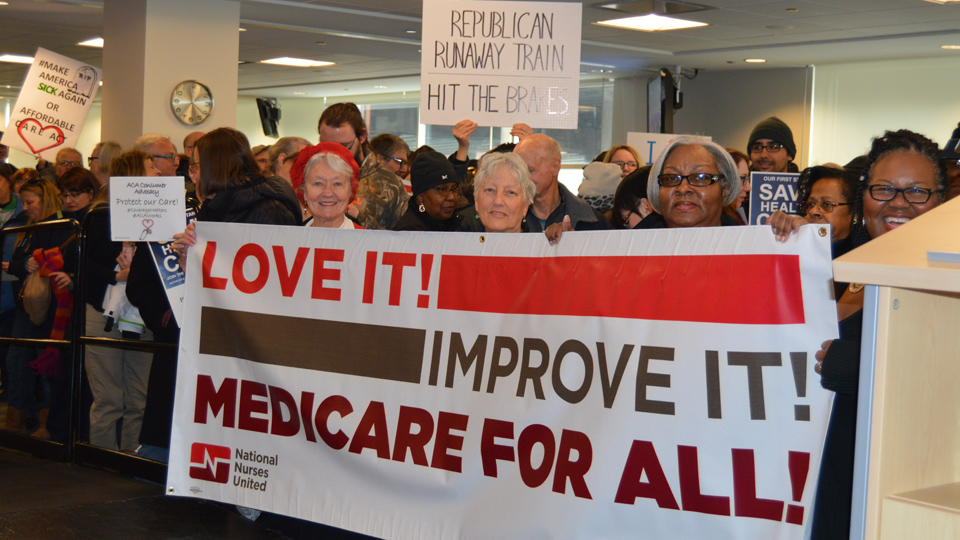
WASHINGTON (PAI) — Nurses from at least five unions – National Nurses United, AFSCME, the Communications Workers, the Office and Professional Employees and the Service Employees – descended on Congress to campaign for a variety of health care causes.
From safe staffing at patients’ bedsides to single-payer government-run national health insurance, also known as Medicare for All, the nurses told lawmakers, or more likely their staffers, that the U.S. health care system needs improvement. Lawmakers are on yet another recess, for 11 days.
And “improvement” doesn’t mean approving the American Health Care Act, which the House’s ruling Republicans jammed through on a party-line vote, 217-213, the week before. That measure, if enacted, would destroy health care for millions of people, the nurses said.
The nurses convened in Washington during National Nurses Week, and they expect solons to heed their voices: Nurses are, again, the most-respected profession in the U.S., opinion polls show. Some 10,000 nurses converged on D.C., OPEIU said, with thousands heading for Congress, too.
But that respect may not be true of the congressional GOP. It defied the polls, which showed only 17 percent of the public supported repealing the 7-year-old Affordable Care Act and replacing it, or not, with the GOP legislation. Some 56 percent opposed ACA repeal and the rest were undecided.
NNU’s 100-plus nurses lobbied for lawmakers to back Medicare for All (HR676), the patient protection legislation that orders health care facilities to set minimum staff ratios for all sections of their institutions – including cardiac care, intensive care and emergency rooms—and to support legislation to lower prescription drug costs.
They also want laws to make hospitals safer. Patient attacks on health care workers – two-thirds of whom are women – are escalating, federal figures show. The Occupational Safety and Health Administration, at NNU request, has started gathering information for rulemaking on the issue. The new GOP Trump administration may call a halt to that investigation.
But single-payer is NNU’s big cause, and 20 other unions, led by the Steelworkers, also support it. “Health care is a human right and the way to make that right a reality for everyone in this country is through an expanded and improved Medicare for All system,” said NNU Co-President Jean Ross, RN.
“Nurses understand that we are in a healthcare crisis that is only going to get worse for our families and communities and so it is imperative that Congress act now to solve the crisis through the implementation of a single-payer system,” Ross added.
“Astronomical healthcare costs and lack of access continue to drive individuals, families and businesses past their breaking point while insurance companies continue to soak-up billions of healthcare dollars as millions of children’s basic needs go unmet,” the NNU adds.
“And it’s a travesty that 49 out of 50 states in the U.S. impose no legal limit on how many patients can be assigned to a nurse at one time in acute care hospitals,” said NNU Co-President Deborah Burger, RN.
The exception: California, where NNU’s state affiliate convinced lawmakers years ago to set minimum nurse-patient ratios. The safe staffing ratios, approved over opposition from both insurers and hospitals, prevent illness, injuries and deaths, said union health and safety director Bonnie Castillo, RN.
“Nurses are speaking powerfully to our elected officials of both parties to tell them what Americans need and that’s a fair, just and equitable healthcare system for all,” NNU Executive Director RoseAnn DeMoro explained.
“Nurses do so much more than just check vitals and administer shots. With great skill and training, they respond in dire situations, when we are most vulnerable…They excel in the face of pressure and provide the healing touch even when things look grim,” AFSCME said before sending its nurse members up to lobby lawmakers.
“Fair pay, improved safety standards and better staffing ratios helps not just nurses, but the patients they serve,” AFSCME added. “We serve people from a variety of cultures, a variety of educational levels,” Samantha Ciechanowicz, an emergency room nurse at Sharp Chula Vista Medical Center in San Diego, told the union.
“We serve not only as their health care providers but sometimes as their families. Sometimes, we can give them support that they otherwise may not have. I like giving quality care to my patients and connecting with them. It’s not just surface level, it’s hopefully connecting with them on a deeper level,” she added.
OPEIU’s nurses concentrated on the safe-staffing ratios issue, said Paige Yates, chair of the union’s nurses council. “Nurses are on the front lines of patient safety, and yet they are increasingly being asked to do more with less resources. Often, hospital administration and corporate CEOs don’t listen to their concerns and patients’ lives are put at risk, not to mention the safety and health of the nursing professionals themselves,” Yates explained.
“Legislation for national nurse to patient ratios has been stalled by big money and associations that care less about nurses and their patients and more about profits. Our elected officials have to understand that it’s their health, their families and their constituents that we’re fighting to protect.”
The Service Employees, who represent thousands of nurses, concentrated on stopping the House GOP’s health care and particularly its cuts in Medicaid, which pays for nursing care for the poor and millions of the elderly.” Cutting Medicaid will hurt families. It’s time to listen to nurses about how to keep patients healthy,” the union said in a tweet.












Comments